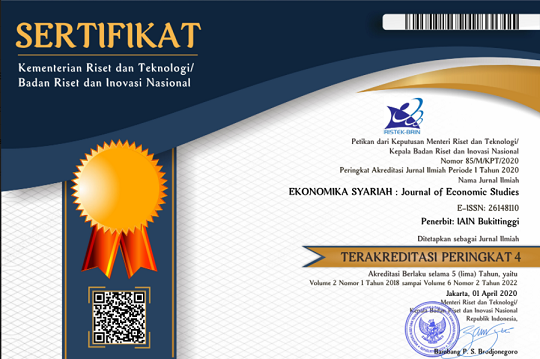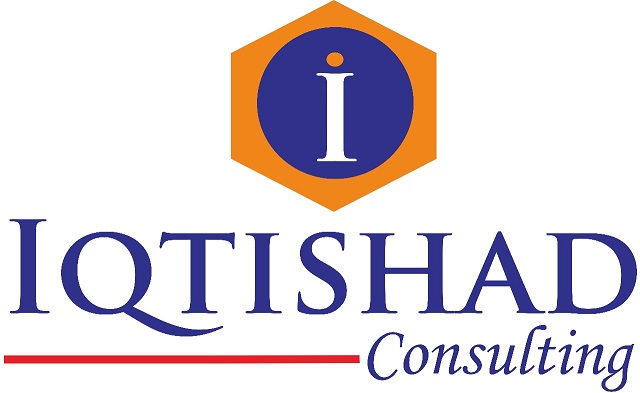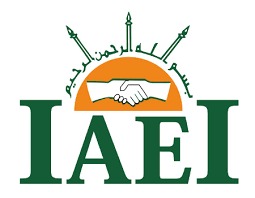Determinants of the Maqashid Syariah Index of Islamic Banks: Implications on Social and Environmental Sustainability
DOI:
https://doi.org/10.30983/es.v9i1.9286Keywords:
Qardhul Hasan, ZPR, maslahat indexAbstract
Islamic banking holds a strategic role in promoting social and environmental sustainability through the implementation of Islamic economic principles. This study aims to analyze the factors influencing the Maqashid Sharia Index in Islamic banks in Indonesia and to examine its implications on multidimensional sustainability. The independent variables in this study are the Zakat Performance Ratio (ZPR) and Qardhul Hasan (QH) financing, with control variables consisting of Return on Assets (ROA) and Non-Performing Financing (NPF). The study employs panel data from Islamic banks in Indonesia over the period 2019–2023, selected using purposive sampling techniques. The data are analyzed using panel regression with the Random Effect Model (REM) approach. The findings indicate that ZPR, QH, ROA, and NPF have a positive and significant partial effect on the Maqashid Sharia Index. These results suggest that simultaneously optimizing social functions and financial performance is crucial for enhancing the contribution of Islamic banks to achieving sustainable Sharia objectives. This approach offers a fresh perspective on evaluating Islamic banking performance,not only in terms of profitability but also in how effectively institutions contribute to the comprehensive realization of Maqashid al-Sharia.
Perbankan Syariah memiliki peran strategis dalam menciptakan kesejahteraan sosial dan keberlanjutan lingkungan melalui prinsip-prinsip ekonomi islam. Tujuan utama penelitian ini untuk menganalisis faktor-faktor yang mempengaruhi Indeks Maslahat pada Perbankan Syariah Indonesia serta mengkaji implikasinya terhadap keberlanjutan sosial dan lingkungan. Variabel independent pada penelitian ini yaitu Zakat Performance Ratio (ZPR) dan pembiayaan Qardhul Hasan (QH). Penelitian ini menggunakan data dari 9 Bank Umum Syariah di Indonesia dalam rentang waktu 2019-2023, yang dipilih melalui Teknik purposive sampling. Data tersebut dianalisis menggunakan regresi data panel, dengan model estimasi yang diterapkan adalah Random Effect Model (REM). Hasil penelitian mengungkapkan bahwa ZPR dan QH, baik secara simultan maupun parsial, berpengaruh positif dan signifikan terhadap Indeks Maslahat dalam Perbankan Syariah di Indonesia. Hasil temuan ini menegaskan bahwa perbankan syariah tidak hanya berfokus pada profitabilitas, tetapi juga memiliki peran dalam tanggung jawab sosial dan lingkungan yang perlu dioptimalkan. Oleh karena itu, diperlukan strategi kebijakan yang lebih progresif dalam mengelola ZPR dan QH agar perbankan Syariah semakin berdaya guna dalam menciptakan keseimbangan antara ekonomi, sosial, dan lingkungan secara berkelanjutan.
References
Badan Pusat Statistik. 2024. “Berita Resmi Statistik.” Bps.Go.Id, no. 27, 1–52. https://papua.bps.go.id.
Abidin, Ahmad Zainal, Norhayati Mohd Alwi, and Noraini Mohd. 2011. “A Case Study on the Implementation of Qardhul Hasan Concept as a Financing Product in Islamic Banks in Malaysia.” Management & Accounting, Supplementary Issue 19 (19): 81–100.
Abidzar Al Fahri, R, and Fiqi Fahri Al Malik. 2021. “Penerapan Maqashid Syariah Index Pada Perbankan Syariah Di Indonesia Application of Maqashid Sharia Index in Sharia Banking in Indonesia.” Journal of Applied Islamic Economics and Finance 1 (3): 586–95.
Addou, Khadija Ichrak, Zakaria Boulanouar, Zaheer Anwer, Afaf Bensghir, and Shamsher Mohamad Ramadilli Mohammad. 2024. “The Impact of Basel III Regulations on Solvency and Credit Risk-Taking Behavior of Islamic Banks.” International Journal of Islamic and Middle Eastern Finance and Management. https://doi.org/10.1108/IMEFM-05-2024-0248.
Andriyani, Melisa. 2021. “Pengaruh Murabahah, Car, Dan Dpk Terhadap Maqasid Syariah Dengan Npf Sebagai Moderating.” Jurnal Ekobis : Ekonomi Bisnis & Manajemen 11 (2): 224–39. https://doi.org/10.37932/j.e.v11i2.382.
Ardiani Ika Sulistyawati, Hanik Ati, Aprih Santoso. 2020. “Telisik Faktor Pengaruh Kinerja Maqashid Syariah Bank Syariah Di Indonesia” 6 (02): 142–50.
Assyarofi, Ayu Almas, and Luluk Muhimatul Ifada. 2023. “The Influence of Financial Ratios and Qardhul Hasan Financing on Financial Performance in Islamic Banks.” International Journal of Current Science Research and Review 06 (08). https://doi.org/10.47191/ijcsrr/v6-i8-20.
Asyraf Wajdi Dusuki and Said Bouheraoua. 2005. “Inference of Velocity Fields with Tomographic Measurements.” 4th World Congress in Industrial Process Tomography, 625–30.
Chapra, M. Umer. 2008. “The Islamic Vision of Development in the Light Of.” Islamic Research and Training Institute, 1–55.
Fauzan, M, Asmuni, and Tuti Anggraini. 2024. “Green Banking Dalam Islam: Konsep Al-Qur’an Tentang Investasi Yang Bertanggung Jawab.” Jurnal Masharif Al-Syariah: Jurnal Ekonomi Dan Perbankan Syariah 9 (1): 451–71. https://www.doi.org/10.30651/jms.v9i1.21402.
Firmansyah, Irman, and Abrista Devi. 2017. “The Implementation Strategies of Good Corporate Governance for Zakat Institutions in Indonesia.” International Journal of Zakat 2 (2): 85–97. https://doi.org/10.37706/ijaz.v2i2.27.
Ghlamallah, Ezzedine, Christos Alexakis, Michael Dowling, and Anke Piepenbrink. 2021. “The Topics of Islamic Economics and Finance Research.” International Review of Economics and Finance 75 (March): 145–60. https://doi.org/10.1016/j.iref.2021.04.006.
Ghozali, Imam. 2018a. Aplikasi Analisis Multivariae Dengan Program IBM SPSS 25. Semarang: Badan Penerbit. Cat IX. Semarang: Badan Penerbit Universitas Diponegoro.
Ghozali, Imam. 2018b. “Aplikasi Analisis Multivariate Dengan Program IBM SPSS 25.” Semarang: Universitas Diponogoro.
Grais, Wafik, and Matteo Pellegrini. 2006. “Corporate Governance and Shariah Compliance in Institutions Offering Islamic Financial Services.” World Bank Policy Research Working Paper November:1–46.http://elibrary.worldbank.org/doi/book/10.1596/1813-9450-4052.
Hameed, Shahul, Ade Wirman, Bakhtiar Alrazi, Mohd Nazli, and Sigit. Pramono. 2004. “Alternative Disclosure and Performance Measures for Islamic Banks.” Second Conference on Administrative Sciences: Meeting the Challenges of the Globalization Age, King Fahd University of Petroleum & Minerals, Dhahran, Saudi Arabia, 19–21.
Harahap, Burhanudin, Tastaftiyan Risfandy, and Inas Nurfadia Futri. 2023. “Islamic Law, Islamic Finance, and Sustainable Development Goals: A Systematic Literature Review.” Sustainability (Switzerland) 15 (8). https://doi.org/10.3390/su15086626.
IFDI. 2023. “Islamic Finance Development Report 2023: Navigating Uncertainty.” Islamic Finance Development Indicator, 76.
Junaidi, Lutfiyah, Z. and Adnan, M. 2017. “The Effectiveness of Interest Free Loan Financing (Qardhul Hasan) as the Social Implementer of Islamic Bank to Reduce Poverty in Surakarta.” Jurnal Akuntansi 11 (2): 421–31.
Kasmir. 2018. Analisis Laporan Keuangan. Jakarta: PT Rajagrafindo Persada.
Mayasari, Firda Alia. 2020. “Pengaruh Islamicity Performance Index Terhadap Profitabilitas Bank Umum Syariah Indonesia Periode 2014-2018.” Kompartemen: Jurnal Ilmiah Akuntansi 18 (1): 22–38. https://doi.org/10.30595/kompartemen.v18i1.6812.
Mohammed, Mustafa Omar, and Dzuljastri Abdul Razak. 2008. “The Performance Measures of Islamic Banking Based on The” 1967 (June): 1–17.
Muhammad Jiyad Naufal, Stefanus Surbakti, Rahulsep Lukas Tampubolon, Robin Silalahi, and Wiwin Zakiah. 2024. “Analisis Dampak Pendidikan Dan Akses Keuangan Terhadap Penanggulangan Kemiskinan.” Jurnal Ekonomi Dan Pembangunan Indonesia 2 (1): 91–101. https://doi.org/10.61132/jepi.v2i1.288.
Mukhibad, Hasan, and Doddy Setiawan. 2022. “Shariah Supervisory Board Attributes and Corporate Risk-Taking in Islamic Banks.” Cogent Business and Management 9 (1). https://doi.org/10.1080/23311975.2022.2158607.
Muneer, Farah, and Foyasal Khan. 2022. “Impact of Qard-Al-Hasan (Interest-Free Loan) Program in Reducing Multidimensional Poverty: An Evidence from the Southwest Bangladesh.” International Journal of Islamic and Middle Eastern Finance and Management 15 (6): 1072–87. https://doi.org/10.1108/IMEFM-03-2021-0101.
Munifatussa, Asma, and Suryani Sri Lestari. 2019. “Determinan Non Performing Financing (NPF) Pada Bank Umum Syariah Di Indonesia Periode 2014-2018.” Sains Ekonomi Dan Perbankan Syariah 9:1–15.
Nihayah, Ana Zahrotun, and Sri Walyoto. 2018. “Identification of Non Performing Financing Alteration Measured by Microeconomic Variable Sharia Banking.” Journal of Finance and Islamic Banking 1 (1): 23–38. https://doi.org/10.22515/jfib.v1i1.1245.
Nomran, Naji Mansour, and Razali Haron. 2022. “Validity of Zakat Ratios as Islamic Performance Indicators in Islamic Banking: A Congeneric Model and Confirmatory Factor Analysis.” ISRA International Journal of Islamic Finance 14 (1): 41–62. https://doi.org/10.1108/IJIF-08-2018-0088.
Nugraheni, Peni, and Rifqi Muhammad. 2024. “The Optimisation of Qardhul Hasan Management in Islamic Banking : Enhancing Its Role in Empowering the Community,” 469–86. https://doi.org/10.1108/JEC-08-2022-0113.
Nugroho, Lucky. 2022. “The Relationship between Maqasid Sharia and Profitability Ratio in Islamic Banking Industries Performance.” Sosyoekonomi 30 (53): 243–59. https://doi.org/10.17233/sosyoekonomi.2022.03.13.
Paltrinieri, Andrea, Alberto Dreassi, Milena Migliavacca, and Stefano Piserà. 2020. “Islamic Finance Development and Banking ESG Scores: Evidence from a Cross-Country Analysis.” Research in International Business and Finance 51 (September 2019): 101100. https://doi.org/10.1016/j.ribaf.2019.101100.
Porter, Gujarati &. 2009. Economics, Essentials O F Economics, Principles O F Of, Economics Issues, Social Economics, Managerial Economics, Intermediate Economics, Advanced Economics, Urban. Introductory Econometrics: A Practical Approach.
Rahma, Fatkhiya Ainur, and Johan Arifin. 2022. “Faktor-Faktor Yang Mempengaruhi Kinerja Maqashid Syariah.” NCAF: Proceeding of National Conference on Accounting & Finance 4:151–57. https://doi.org/10.20885/ncaf.vol4.art20.
Rudi Setiyobono, Nurmala Ahmar, and Darmansyah. 2019. “Pengukuran Kinerja Perbankan Syariah Berbasis Maqashid Syariah Index Bank Syariah Di Indonesia : Abdul Majid Najjar Versus Abu Zahrah.” Jurnal Riset Akuntansi & Perpajakan (JRAP) 6 (02): 111–26. https://doi.org/10.35838/jrap.v6i02.1249.
Sachs, Jeffrey, Guillaume Lafortune, and Grayson Fuller. 2024. The SDGs and the UN Summit of the Future. Sustainable Development Report 2024. Sustainable Development Solutions Network. https://doi.org/10.25546/108572.
Samudera, Ahmad Bayu, Depid Ismail, Suhendi Suhendi, and Sarip Muslim. 2024. “The Development of Islamic Financial Instrument: Opportunities and Challenges.” Likuid Jurnal Ekonomi Industri Halal 4 (2): 93–114. https://doi.org/10.15575/likuid.v4i2.35781.
saqib, Lutfullah, Mueen Aizaz Zafar, Khurram Khan, Kellie W. Roberts, and Aliya Mueen Zafar. 2015. “Local Agricultural Financing and Islamic Banks: Is Qard-Al-Hassan a Possible Solution?” Journal of Islamic Accounting and Business Research 6 (1): 122–47. https://doi.org/10.1108/JIABR-04-2012-0018.
Selim, Mohammad. 2019. “The e Ff Ectiveness of Qard-Al-Hasan (Interest Free Loan) as a Tool of Monetary Policy.” https://doi.org/10.1108/IMEFM-07-2017-0187.
Sudirman, Blongkod, Harun, Herlina Rasjid, and Dewiindrayani Hamin. 2023. “Measuring the Performance of Sharia Commercial Banks in Indonesia Using the Islamicity Performance Index (IPI) and Maqashid Sharia Index (MSI) Access to Success” 24 (196): 105–12. https://doi.org/10.47750/QAS/24.196.14.
Sutrisno, & Widarjono, A. 2018. “Maqasid Sharia Index, Banking Risk and Performance Cases in Indonesian Islamic Banks.” Asian Economic and Financial Review 8 (9): 1175–1184. https://doi.org/https://doi.org/10.18488/journal.aefr.2018.89.1175.1184.
Tajudin, Makhdaleva Hanura, And Ade Sofyan Mulazid. 2017. “Pengaruh Promosi, Kepercayaan Dan Kesadaran Merek Terhadap Keputusan Nasabah Menggunakan Produk Tabungan Haji (Mabrur) Bank Syariah Mandiri Kcp. Sawangan Kota Depok.” ISLAMICONOMIC: Jurnal Ekonomi Islam 8 (1): 19–46. https://doi.org/10.32678/ijei.v8i1.64.
Taufik, Muhammad, Rifqi Muhammad, and Peni Nugraheni. 2023. “Determinants and Consequences of Maqashid Sharia Performance: Evidence from Islamic Banks in Indonesia and Malaysia.” Journal of Islamic Accounting and Business Research 14 (8): 1426–50. https://doi.org/10.1108/JIABR-07-2021-0205.
Ulfa, Diana, and Utami Tri Sulistyorini. 2018. “Analisis Pengaruh Kualitas Produk, Kualitas Layanan, Lokasi, Dan Promosi Terhadap Keputusan Nasabah Menabung Kembali (Studi Pada PT BPD Jawa Tengah Kantor Cabang Pembantu Syariah UNISSULA).” Jurnal Sains Ekonomi Dan Perbankan Syariah 8 (1): 62–72.
Word Bank. 2023. Poverty and Shared Prosperity Report. Managing Automation. Vol. 24. Reversing the Pandemic’s Effects on Poverty and Inequality.
Yaya, R., Martawireja, A. E., & Ahim, A. 2014. Akuntansi Perbankan Syariah : Teori Dan Praktik Kontemporer. 2nd ed. Jakarta: Salemba Empat.
Zakiy, Faris Shalahuddin, Falikhatun Falikhatun, and Najim Nur Fauziah. 2023. “Sharia Governance and Organizational Performance in Zakat Management Organization: Evidence from Indonesia.” Journal of Islamic Accounting and Business Research. https://doi.org/10.1108/JIABR-06-2023-0188.
Downloads
Published
How to Cite
Issue
Section
Citation Check
License
Copyright (c) 2025 Nurun Nadia, Muhammad Muflih, Ruhadi

This work is licensed under a Creative Commons Attribution-ShareAlike 4.0 International License.
Authors who publish with this journal agree to the following terms:
- Authors retain copyright and grant the journal right of first publication with the work simultaneously licensed under a Creative Commons Attribution-ShareAlike 4.0 International License that allows others to share the work with an acknowledgment of the work's authorship and initial publication in this journal.
- Authors are able to enter into separate, additional contractual arrangements for the non-exclusive distribution of the journal's published version of the work (e.g., post it to an institutional repository or publish it in a book), with an acknowledgment of its initial publication in this journal.
- Authors are permitted and encouraged to post their work online (e.g., in institutional repositories or on their website) prior to and during the submission process, as it can lead to productive exchanges, as well as earlier and greater citation of published work (See The Effect of Open Access).




